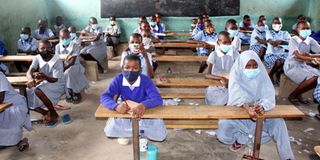Reopening shelved as schools grapple with cash challenges

Standard Eight pupils at Lodwar Girls Primary School wait to sit the Knec test.
What you need to know:
- Teachers have also been racing against time to meet this term’s deadlines, amid fears that the coronavirus infections could lead to closures, as happened in three Mombasa schools.
- Knec says the tests are meant to test learners’ ability to recall what they had studied before schools closed in March.
Lack of money, inadequate resources, learners who can barely remember past lessons and uncertainty on how to proceed with the academic calendar have characterised the past two weeks in public schools.
While questions have emerged about the level of preparedness of Standard Eight and Form Four candidates who will sit their tests in April 2021, most schools face challenges related to funding and compliance with the Ministry of Health guidelines meant to combat the Covid-19 pandemic.
Teachers have also been racing against time to meet this term’s deadlines, amid fears that the coronavirus infections could lead to closures, as happened in three Mombasa schools.
A week after schools reopened, teachers and learners were caught unprepared by the Kenya National Examination Council (Knec) assessments.
Knec says the tests are meant to test learners’ ability to recall what they had studied before schools closed in March.
The assessment, which ends tomorrow, has proved difficult for many learners with public school teachers saying a majority are struggling to answer the questions.
Some Grade Four pupils can barely read and write.
Kenya Certificate of Primary Education (KCPE) examination candidates are struggling to answer questions derived from lower class syllabi.
Pay fees
Lack of funds has made a number of headteachers to ask parents to pay fees and money for the printing of the assessment materials.
The Ministry of Education did not give schools money to facilitate the downloading and printing of the papers.
To print the papers, teachers had to visit cyber cafes. A majority of schools do not have access to internet.
In many rural areas, heads directed every learner to pay Sh200-Sh400 to print the papers.
Some children have not reported back to school.
Pregnancies have been cited as the main reason some girls failed to turn up while boys started boda boda and other businesses.
University Education and Research Principal Secretary Simon Nabukhwesi asked heads to ensure that every learner is in school.
“The pandemic is with us and I urge you to observe the required protocols such as social distancing, frequent handwashing and wearing face masks,” Mr Nabukhwesi said yesterday.
“The ministry expects every child to pass the national examinations and join Form One, university or college.”
The PS admitted that public schools have had problems but told headteachers that the government is doing all it can to fund schools.
Limited resources
High school principals have complained of limited resources.
The schools are in financial dire straits since many parents have not paid fees.
Kenya Secondary School Heads Association (Kessha) chairman Kahi Indimuli urged parents to clear fee balances.
Many schools, especially those in rural Kenya, have rundown infrastructure.
According to a World Health Organization and Unicef report released in August, some 26 girls share a toilet in most schools in the country. The number for boys is 30.
Anti-coronavirus health protocols require every school to have an operational health centre to cater for medical emergencies.
Very few schools have qualified nurses.
Sharp increase
Only secondary school students are covered by the National Health Insurance Fund through the Edu Afya programme.
Health Chief Administrative Secretary Mercy Mwangangi has confirmed coronavirus cases in schools involving teachers and learners.
She said the ministry has dispatched medical personnel to the affected schools.
The government has shelved the phased reopening of other classes following a sharp increase in the new number of daily Covid-19 cases in the last two weeks.
Education Cabinet Secretary George Magoha said Grade Four, Std Eight and Form Four learners will remain in school until the Covid-19 curve begins to flatten.





